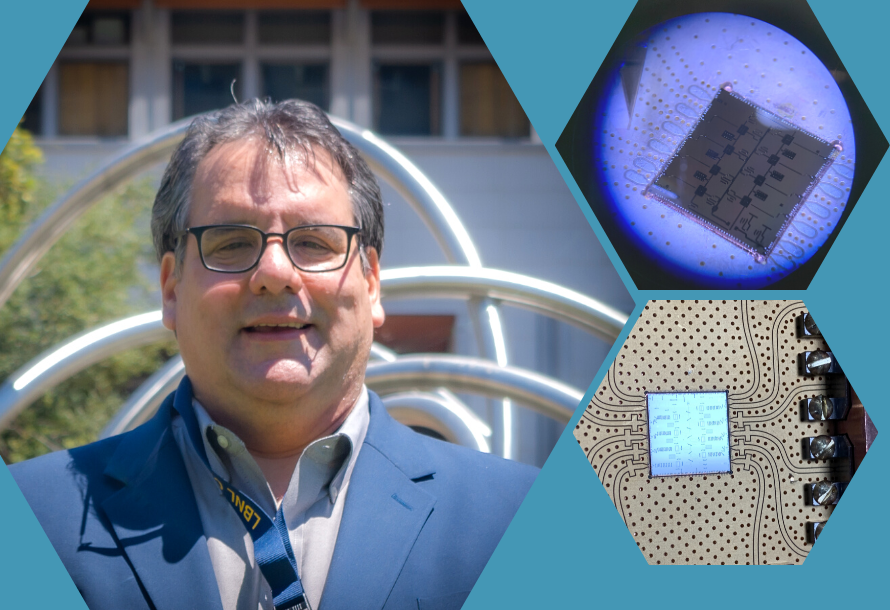AQT at Berkeley Lab brings together diverse researchers for quantum computing
The Advanced Quantum Testbed (AQT) at Lawrence Berkeley National Lab (Berkeley Lab) is a research and development program in quantum information science (QIS) funded by the U.S. Department of Energy Office of Science Advanced Scientific Computing Research (ASCR) program. Launched in 2018, AQT develops superconducting circuits and processors for quantum computing and implements quantum algorithms for various applications in materials science, nuclear physics, among others.
Since its foundation, the collaborative vision of AQT has incorporated scientists from different backgrounds and fields. David Iván Santiago is the technical lead at AQT overseeing the programmatic technical needs of the program. Santiago also leads the Quantum Information Science and Technology (QuIST) group at Berkeley Lab’s Applied Math and Computational Research division.
Originally from Puerto Rico, Santiago describes his beginnings in physics: “I was curious, and I liked math from an early age. I always studied independently and learned more than what was assigned by my teachers at grade school in San Juan. I remember wishing to apply mathematics since I was young to understand the natural world.”
Santiago earned his undergraduate degree in physics at the University of Puerto Rico, Río Piedras Campus. Later, he pursued his doctorate in astrophysics and cosmology at Stanford University in California. His focus was the theory of general relativity and the origin of the universe.
As he advanced in his 5-year academic career and postdoctoral research, Santiago switched to condensed matter physics to explore the quantum behavior of the states and transformations of different materials.
After five years of study and research, Santiago decided to leave academics for the private sector in a transformative period of his life. In 2009, he joined a small company as a scientific advisor where he supported two U.S. government agencies – the Department of Defense and the Office of the National Director of Intelligence. As a consultant, David assessed different scientific projects in materials physics and electronic devices.
“I found a niche in quantum computing gradually and organically. It was not a decision based on a clear prior interest or passion. I understood it thanks to my background in physics and mathematics, but in reality, I learned along the way on the job. So I was able to work on advancing some of the first quantum processors and devices,” he said.
In 2016, Santiago changed jobs in the private sector to continue modeling experiments and hardware for quantum computing.
“To execute a quantum algorithm, for example, you have to know about materials physics in order to fabricate a quantum device for it. So, quantum computing was something that I started to like because I always want to learn how things work at different levels,” he said.
During his time in the private sector, Santiago met Irfan Siddiqi, faculty scientist at Berkeley Lab and AQT director. Eager to get back into fundamental science and research and development, Santiago joined the AQT team in 2018.
“Physics – as the field for research and development – is not very present in the public consciousness, and yet its principles and advances are found in our modern livelihood, cell phones, computers, etc. I would like to see quantum computing reach its potential and be able to contribute to its growth through programs such as AQT, which are supporting the broader community of users and nurturing diverse talent,” said Santiago.
AQT opened its testbed to the national and international community in 2020, providing free and open access to the entire computing stack to users. Startups, national laboratories, and academic researchers collaborate directly with the AQT team for up to six months. Seeking to publish in top peer-reviewed scientific journals, the experiments are tailored to the needs and specifications of the users at no additional cost. Additionally, users can conduct experiments on the AQT testbed with technologies developed elsewhere.
AQT seeks to be a collaborative hub for the broader national and international community and prepare the new generations of researchers from a variety of backgrounds. The program has recently announced its open call requesting new research proposals. The deadline for the submission of a brief Letter of Intent (LOI) is November 5. For more information on how to get started, visit: https://aqt.lbl.gov/about-aqt/collaborate-with-us/
Founded in 1931 on the belief that the biggest scientific challenges are best addressed by teams, Lawrence Berkeley National Laboratory and its scientists have been recognized with 14 Nobel Prizes. Today, Berkeley Lab researchers develop sustainable energy and environmental solutions, create useful new materials, advance the frontiers of computing, and probe the mysteries of life, matter, and the universe. Scientists from around the world rely on the Lab’s facilities for their own discovery science. Berkeley Lab is a multiprogram national laboratory, managed by the University of California for the U.S. Department of Energy’s Office of Science.
DOE’s Office of Science is the single largest supporter of basic research in the physical sciences in the United States, and is working to address some of the most pressing challenges of our time. For more information, please visit energy.gov/science.
